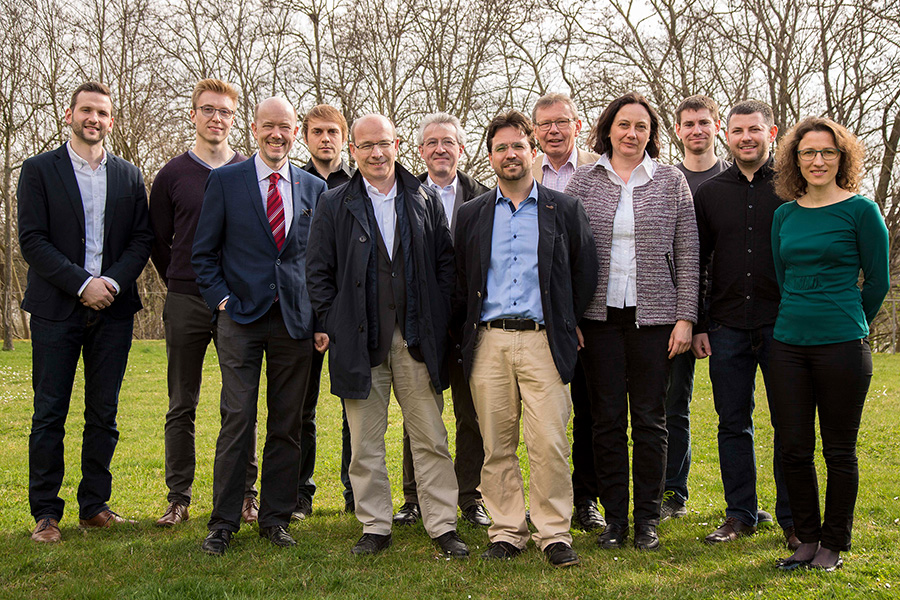CDS Scientists research platform chemicals from renewable resources
Process engineers at the Otto von Guericke University Magdeburg are successfully working on replacing the raw materials crude oil and natural gas, which were previously used for the production of many chemical products, with renewable raw materials. Against the backdrop of dwindling fossil resources, they are working with colleagues from Dortmund, Berlin and Magdeburg to find new, highly efficient and sustainable production routes that can be used to convert long-chain hydrocarbons into starting materials for paints, coatings, medicines, detergents and cleaning agents.
 Project group of the Collaborative Research Centre Transregio 63 (Photo: Harald Krieg/University of Magdeburg)
Project group of the Collaborative Research Centre Transregio 63 (Photo: Harald Krieg/University of Magdeburg)
"Most chemical production processes today are still based on petrochemical raw materials, i.e. ultimately on crude oil, which will become increasingly expensive in the long term and whose use pollutes the environment," explains Prof. Dr.-Ing. Kai Sundmacher from the university's Institute of Process Engineering. "Instead of crude oil, we now want to use long-chain hydrocarbons that can be obtained from renewable raw materials, e.g. sunflowers"
Special homogeneous catalysts are used to make the chemical conversion processes more efficient and environmentally friendly. These catalysts float in the reaction mixture and can convert each raw material molecule into the desired product molecule in a targeted manner. However, the catalysts must be separated from the product after use. This recycling is necessary for economic reasons because the catalysts used consist of high-grade metals (e.g. rhodium) and complex organic structures (ligands).
17 million euros in funding from the German Research Foundation
The project, which has been running since 2010, is funded by the German Research Foundation (DFG) within the Collaborative Research Centre / Transregio 63 "InPROMPT: Integrated Chemical Processes in Liquid Multiphase Systems" with a total of 17 million euros until the end of 2017. More than 60 scientists from the Otto von Guericke University Magdeburg, the Technical Universities of Berlin and Dortmund, the Berlin University of Applied Sciences and the Max Planck Institute for Dynamics of Complex Technical Systems Magdeburg are involved in this joint project.
According to Sundmacher, it is a great challenge to completely recover the catalysts used. "This can be achieved by using switchable solvents which, when cooled, break down into two liquid phases. In one phase, the target product then accumulates, in the other phase the catalyst," Professor Sundmacher explains.
In the Institute of Process Engineering at the Otto von Guericke University Magdeburg, a new type of experimental reactor is currently being used to investigate how the reactants, the catalyst and the solvent must be fed into the production process in order to achieve an optimum product yield. The experimental reactor was developed in co-operation with the TU Dortmund University and is part of a plant in which the entire production process is simulated. This miniature plant enables the scientists to realistically evaluate the course of the chemical reaction, the stability of the homogeneous catalyst and the efficiency of the switchable solvent systems. The knowledge gained at the plant forms the basis for a later transfer of the novel production process into industrial application.
 The scientists Jens Dreimann, Michael Jokiel, Prof. Dr. Kai Sundmacher and Stefanie Markstein (from left to right) from Magdeburg and Dortmund discuss the last details at the experimental reactor before its transfer to Dortmund. The experimental reactor is part of a plant in which the entire chemical production process is simulated. (Photo: Harald Krieg/University of Magdeburg)
The scientists Jens Dreimann, Michael Jokiel, Prof. Dr. Kai Sundmacher and Stefanie Markstein (from left to right) from Magdeburg and Dortmund discuss the last details at the experimental reactor before its transfer to Dortmund. The experimental reactor is part of a plant in which the entire chemical production process is simulated. (Photo: Harald Krieg/University of Magdeburg)
"In the long term, we want to develop a methodology that allows us to predict the optimum process configuration, the most intelligent operational management and the best solvent on the basis of computer simulations. This would make it possible to greatly accelerate process development as a whole and plan the experiments in such a way that the greatest possible gain in information is achieved", explains the Magdeburg coordinator of the project, Prof. Dr.-Ing. "The Magdeburg sub-projects assume an important bridging function within the Collaborative Research Centre by translating the basic chemical-physical data and sub-processes into efficient production concepts".
Photos to download:
Bild 1 // Source: Harald Krieg/University of Magdeburg // Caption: The scientists Jens Dreimann, Michael Jokiel, Prof. Dr. Kai Sundmacher and Stefanie Markstein (from left to right) from Magdeburg and Dortmund discuss the last details at the experimental reactor before it is transferred to Dortmund. The experimental reactor is part of a plant in which the entire chemical production process is simulated.
Bild 2 // Source: Harald Krieg/University of Magdeburg // Caption: Project group of the Collaborative Research Centre Transregio 63





